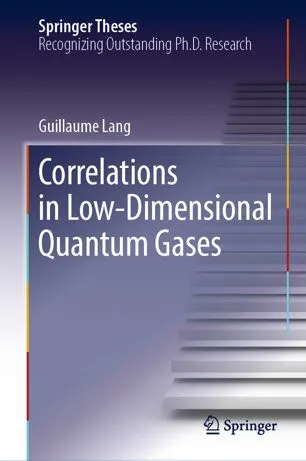Correlations in Low-Dimensional Quantum Gases
4.5
Reviews from our users

You Can Ask your questions from this book's AI after Login
Each download or ask from book AI costs 2 points. To earn more free points, please visit the Points Guide Page and complete some valuable actions.Related Refrences:
Introduction to "Correlations in Low-Dimensional Quantum Gases"
"Correlations in Low-Dimensional Quantum Gases" is a comprehensive exploration of one of the most fascinating and rapidly evolving areas in quantum physics. Written with both passion and precision, this book delves into the theoretical and experimental advancements in the study of low-dimensional quantum systems, emphasizing particle correlations and their impact on physical behavior. By addressing the principles of quantum mechanics through the lens of modern advancements, the book brings together insights that cater to both seasoned researchers and enthusiastic learners.
In recent years, the rise of ultracold atomic gases in low-dimensional settings has brought renewed attention to the fundamental aspects of quantum many-body physics. Reduced dimensionality profoundly influences quantum systems, enhancing the role of correlations and leading to some of the most striking phenomena observed in physics today. This book serves as a bridge between classical textbook knowledge and cutting-edge research, providing a unified framework to understand these exotic quantum systems.
Detailed Summary of the Book
The book begins by introducing the reader to the foundational concepts of low-dimensional quantum systems, focusing on the unique properties of one-dimensional (1D) and two-dimensional (2D) gases. It establishes the theoretical groundwork while highlighting key experimental breakthroughs that have defined this field. Special attention is given to the interplay between quantum statistics, particle interactions, and dimensionality in shaping the behavior of quantum systems.
The middle chapters dive deep into the nature of correlations. By examining frameworks like the Luttinger liquid theory, integrable systems, and the Bose-Hubbard model, the book uncovers how correlations manifest in observables such as density fluctuations, momentum distributions, and coherence properties. Both exact solutions and approximations are discussed, making this content accessible yet rooted in scientific rigor.
In the latter part, advanced topics are addressed: the role of quantum entanglement in low-dimensional systems, effects of trapping potentials, and the dynamics of quenched systems. The book carefully illustrates how quantum correlations evolve over time, both in-equilibrium and out-of-equilibrium. By incorporating real-world experimental setups, such as optical lattices and fermionic systems, the book ensures relevance to contemporary research.
The final sections provide an outlook on emerging directions, such as the exploration of quantum gases under synthetic dimensions and topological effects in low-dimensional setups. Throughout the book, a balance between theory and experiment is maintained, ensuring that readers benefit from a holistic understanding of the topic.
Key Takeaways
- Understand how reduced dimensionality alters quantum systems, leading to enhanced correlations and unique physical phenomena.
- Gain in-depth knowledge of theoretical approaches, including exact solutions, approximations, and numerical methods related to low-dimensional gases.
- Explore experimental advancements in optical lattices, ultracold atomic gases, and spin systems that validate theoretical predictions.
- Learn how low-dimensional quantum systems serve as platforms for realizing quantum simulation and quantum information processing.
- Discover emerging trends, such as studying synthetic dimensions and utilizing tools from quantum entanglement theory to characterize correlations.
Famous Quotes from the Book
While presenting the concepts, several memorable and thought-provoking quotes stand out. Here are some highlights:
"In low-dimensional quantum systems, the rules of traditional physics are revised, offering a glimpse into the astonishing richness of nature’s simplicity."
"Correlations are the fingerprints of quantum systems, revealing an intricacy that mere particles in motion could never explain."
"The beauty of low-dimensional systems lies not in their constraints, but in how these constraints open doors to boundless quantum phenomena."
Why This Book Matters
"Correlations in Low-Dimensional Quantum Gases" is more than just an academic text; it is a roadmap to understanding one of the forefronts of modern physics. As the pursuit of controllable quantum systems accelerates, this book equips readers to harness the power of low-dimensional setups for applications in quantum computation, simulation, and materials science.
The study of low-dimensional quantum gases reveals deep principles, such as the role of particle statistics and quantum coherence in determining macroscopic behavior. These insights resonate far beyond the laboratory, offering potential breakthroughs in technology and a deeper understanding of the quantum world.
The significance of the book extends to educators, enabling them to present complex topics in a structured format, and to experimentalists, inspiring new avenues of research. With its blend of accessibility, rigor, and relevance, this book has the potential to influence both the present and future generations of physicists and quantum enthusiasts.
Free Direct Download
You Can Download this book after Login
Accessing books through legal platforms and public libraries not only supports the rights of authors and publishers but also contributes to the sustainability of reading culture. Before downloading, please take a moment to consider these options.
Find this book on other platforms:
WorldCat helps you find books in libraries worldwide.
See ratings, reviews, and discussions on Goodreads.
Find and buy rare or used books on AbeBooks.
1075
بازدید4.5
امتیاز0
نظر98%
رضایتReviews:
4.5
Based on 0 users review
Questions & Answers
Ask questions about this book or help others by answering
No questions yet. Be the first to ask!






![The Ultimate iOS Interview Playbook: Conquer Swift, frameworks, design patterns, and app architecture [Team-IRA]](https://s3.refhub.ir/images/thumb/The_Ultimate_iOS_Interview_Playbook__Conquer__29925.webp)







